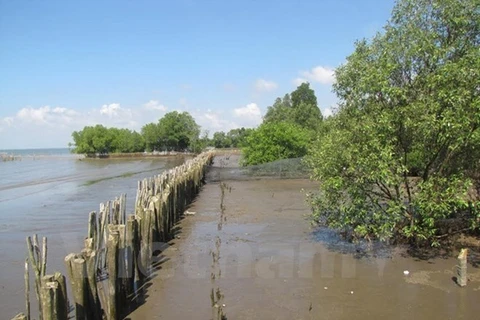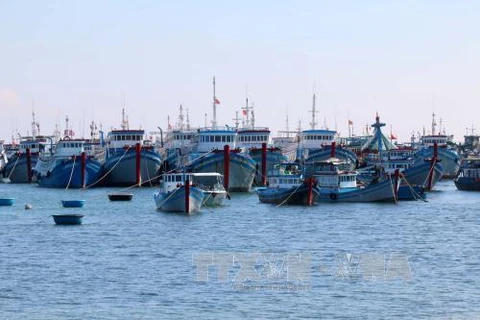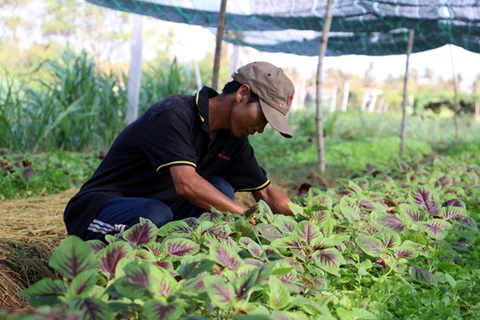Ben Tre (VNA) - The Mekong Delta province of Ben Tre plans to convert 6,000 hectares of low-efficient rice production to high-value crops in order to adapt to the increasingly severe impacts of climate change, a local official said.
According to the provincial Department of Agriculture and Rural Development, in 2016, the rice growing area was 58,246 hectares, falling 7.5 percent from 2015 while the areas developed for grass and coconut cultivation were 3,035 hectares and 69,330 hectares, up 15.8 percent and 1.1 percent, respectively.
In the context of increasing saltwater intrusion, over 852 hectares of low-harvest rice have been shifted to other crops with higher values, such as fruit trees, vegetables, and grass used as feed for livestock.
In 2013, Nguyen Tri Nhan from Chau Hung commune, Binh Dai district planted 120 coconut trees on 4,000 sq. m. of rice growing land. After three years, the coconut trees started giving fruits and he earned over 50 million VND in 2016.
Nhan said he toiled and spent more money growing rice but getting lower profit than the cultivation of coconut trees.
Now he grew coconut trees on 8,000 sq. m. of low-efficient rice fields.
Meanwhile, Vo Thanh Long, also from the commune, said he grew custard-apple trees instead of rice, and could earn 50 million VND on 1,000 sq. m. of land, much higher than rice.
Tran Phong Linh, Vice Chairman of the Chau Hung commune People’s Committee said local farmers can earn a profit of between 500,000 – 700,000 VND from a rice crop but 7 – 8 million VND per year from fruit trees, even 20 – 25 million VND per year from pomelo trees.
Nguyen Tan Khoa from Quoi Dien commune, Thanh Phu district said he grew coconut trees and grass instead of rice on over 3,000 sq. m, and raised five cows and 10 goats. He said he will reduce the herd when the coconut trees grow up.
According to Truong Thanh Hai, an agriculture official from Thanh Phu district said the district was seriously affected by droughts and saltwater intrusion in 2016. To cope with the situation, local farmers were encouraged to grow saltwater-tolerant crops.
In 2016, around 300 hectares of rice growing land were replaced with coconuts and grass.
The Mekong Delta has more than 3.8 million hectares of agricultural land, and the area for rice farming accounts for roughly half of it, ranging between 1.6-1.8 million hectares.
The region makes up nearly 50 percent of the nation’s rice growing area, more than 70 percent of area for aquaculture, producing 40 percent of total agricultural production value, and more than 50 percent of aquatic product output.
A climate change scenario shows that 90 percent of the agricultural land in the Mekong Delta is vulnerable to flooding, and 70 percent to saline intrusion.
Rice productivity is projected to fall by 50 percent by 2100 due to increasing floods and saline intrusion.-VNA
VNA
























